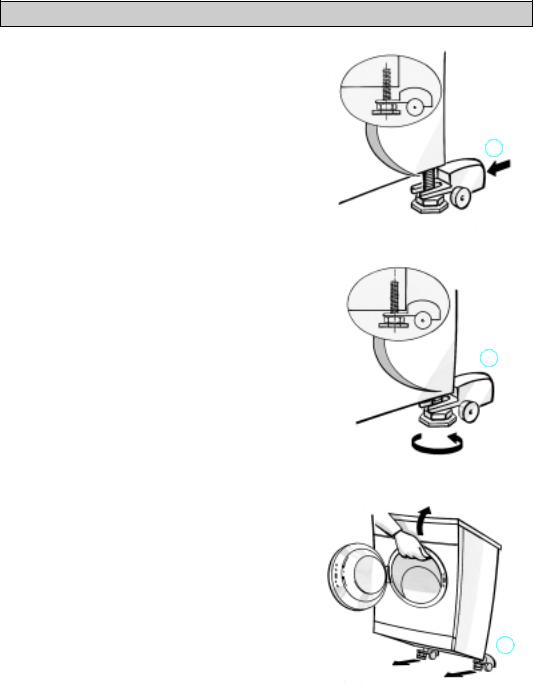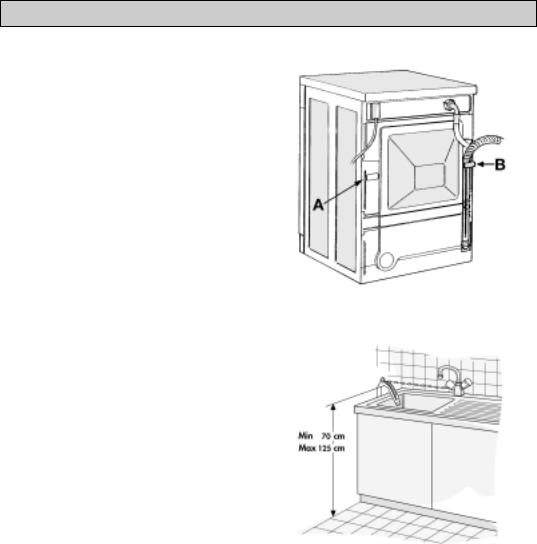Whirlpool AWM 241, AWM 283/1, AWM 283/3(0901), AWM 483/3 INSTRUCTION FOR USE

INSTALLATION INSTRUCTIONS
MOBILITY WHEELS (for UK only)
Depending on model, your washing machine is provided with mobility wheels.
You will find these wheels in the accessory kit supplied with the machine, or you can order them from our
After-Sales Service.
1
MOUNTING INSTRUCTIONS
1.Tilt the machine forward.
2.Loosen the two rear feet.
3.Insert the wheels as close as possible to the screw (1).
4. Tighten the screw completely (2). |
2 |
5.Put the machine in an upright position.
6.Adjust the front feet making sure that the machine is completely level with the floor.
Note: Levelling is extremely important to avoid any risk of instability and vibrations.
MOVING THE MACHINE
1.Open the door of the machine.
2.Lift the machine by 1 or 2 cm (3).
3.Push or pull the machine according to your need.
3
22

INSTALLATION INSTRUCTIONS
1) ELECTRICAL CONNECTIONS
“Warning - this appliance must be earthed”
This appliance is normally supplied with a mains lead having a plug fitted in the factory which has been checked for correct earth continuity.
If the fitted plug is not suitable for your socket outlet, or if the machine’s mains lead is not fitted with a plug, you should fit a suitable new, good quality plug by following the instructions in (2) below.
Any unsuitable plug should be cut off and disposed of in order to avoid a possible shock hazard should it be inserted into a socket.
2) CONNECTION TO A REWIRABLE PLUG - to be carried out only by a qualified electrician
The wires in the mains lead are coloured in accordance with the following code:
BLUE - “NEUTRAL” (“N”) BROWN - “LIVE” (“L”)
GREEN AND YELLOW - “EARTH” (“E”)
To fit a new plug, proceed as follows:
2.1Polarized Plugs (e.g. 3 pin, 13 amp plug conforming to BS 1363A)
c.The GREEN AND YELLOW wire must be connected to the terminal in the plug which is marked with the letter “E” or by the Earth symbol  or coloured yellow or green and yellow.
or coloured yellow or green and yellow.
d.The BLUE wire must be connected to the terminal which is marked with the letter “N” or coloured black.
e.The BROWN wire must be connected to the terminal which is marked with the letter “L” or coloured red.
2.2Non-polarized plugs (e.g. 2 pin with side earth contact)
The wire which is coloured GREEN AND YELLOW must be connected to the earth contact. The other two wires should be connected to the two pins, irrespective of colour.
3) FUSE REPLACEMENT
If the mains lead of this appliance is fitted with a BS 1363A 13 amp fused plug, replace the fuse only with an A.S.T.A. approved type conforming to BS 1362 and proceed as follows:
1.Remove the fuse cover (A) and the fuse (B).
2.Fit the replacement 13 A fuse into the fuse cover.
3.Refit both into the plug.
For all other types of plug, the supply socket should be protected by a 16 A fuse or circuit breaker at the distribution board.
21

INSTALLATION INSTRUCTIONS
DRAIN HOSE
•Drain hose connection to water outlet.
1.Unhook the drain hose from the left clip, (see arrow A Fig. 1.)
Do not loosen the drain hose connection, see arrow B in Fig. 1, otherwise there is the risk of leakage (danger of scalding with hot water).
2.Fix the “U” bend supplied (inside the drum) to the free end of the drain hose.
3.Fit the drain hose either to the siphon or hook it over the edge of a sink or bath tub with the “U” bend (Fig. 2).
Small hand basins are not suitable.
4.Minimum drain height: 70 cm Maximum drain height: 125 cm
5.If you need to add an extension, use a flexible hose of the same type and secure the union with screw-on hose clips.
Maximum overall drain hose length: 2.50 m.
Important:
Make sure there are no kinks in the drain hose run and take precautions against it falling while the appliance is running.
CONNECTION TO THE MAINS
•Observe local utility company regulations.
•The appliance must be connected to the mains exclusively by means of a socket with an earth connection in accordance with established regulations. The system must be earthed. The manufacturer declines all responsibility for injury to persons or pets and damage to property caused by disregarding the above instructions.
•The data concerning voltage, consumption and necessary fuse are supplied on the inside of the appliance door.
•The mains connection cable may only be replaced by a qualified electrician.
•The appliance conforms to European safety regulations, EC directive
EC directive 93/68/EWG and EN 60555.
•Do not use extension leads or multisockets.
Fig. 1
Fig. 2
20

INSTALLATION INSTRUCTIONS
WATER SUPPLY
•Water supply: only cold water.
•Tap: 3/4" threaded hose connector.
•Water pressure (mains pressure): 10-100 N/cm2 (1-10 bar).
INLET HOSE(S)
1.Insert the mesh filter supplied in the thread on the end of the inlet hose(s) and the tap(s).
2.Carefully screw the inlet hose(s) to the tap(s) preferably by hand, taking care that the hose is not kinked.
3.Turn the tap(s) on fully and check that the joints at the washing machine and the tap(s) are watertight.
•If the hose is not long enough, replace it with a suitable length of pressure-resistant hose (approved under EN 500 65 to withstand a minimum of 10 bar).
•Check the hose regularly for brittleness and cracks and replace if necessary.
•The washing machine may be connected without a non-return valve.
•Observe any special local regulations regarding connection to the water supply.
WATER STOP (depending on model)
•The inlet hose and the plastic enclosure at the water connection contain electrical components.
•Do not cut the flexible hose and do not immerse the plastic enclosure in water.
•If the hose is damaged, unplug the appliance from the mains immediately.
•If the hose is not long enough, replace it with a 3 m long Water Stop hose (available from After-Sales Service or a specialist dealer). This must be done only by a qualified electrician.
19

INSTALLATION INSTRUCTIONS
INSTALLATION
•Install the appliance on a solid and level floor surface, preferably in a corner of the room.
•Make sure that all four feet are resting firmly on the floor, and check that the appliance is perfectly level (use a spirit level).
•If the floor is uneven, adjust the levelling feet as required (do not insert pieces of wood, cardboard etc. under the feet).
1.Slacken the locknut with the spanner supplied.
2.Adjust the height of the foot, turning it by hand.
3.Tighten the locknut anticlockwise towards the washing machine.
•If the appliance is to be installed on a wooden floor, distribute the weight by placing it on a 60 x 60 cm sheet of plywood at least 3 cm in thickness.
Secure the plywood sheet to the floor.
BUILT UNDER/ WORKTOP
The appliance must be installed only under a fitted continuous kitchen worktop.
The appliance must only be built under using the built under set UBS.
•Unplug the appliance from the mains.
1.Unscrew the worktop fixing screws from the rear of the appliance.
2.Slide the worktop fully backward and lift it upwards to remove.
Install the cover panel following the relative instructions.
3.Refit the fixing screws and tighten them.
BUILD-UNDER OPENING DIMENSIONS
Width |
600 mm |
Height |
825 mm |
Depth |
600 mm |
WARNING:
Only plug the machine into the mains power socket after you have fitted the cover panel or the machine worktop.
18

INSTALLATION INSTRUCTIONS
TRANSIT BOLTS
The appliance is fitted with transit bolts to prevent internal damage while it is being moved.
Before using the appliance the transit bolts MUST be removed (Fig. 1).
1.Slacken the bolts with the spanner supplied (Fig. 2).
2.Unscrew the bolts by hand.
3.Hold each bolt head and pull the bolts complete with red plastic spacer through the wide part of the holes.
4.Close the holes with the provided plastic caps. Fit the caps in the direction indicated by the arrow in the large opening and slide them into the narrow slot until they sit properly (Fig. 3).
5.Keep the transit bolts for future use.
Note:
Fit the transit bolts before transporting the appliance as follows: pry up the plastic caps with a screwdriver, slide them out against the direction indicated with the arrow and remove them. Fit the transit bolts by following the above procedure in reverse order.
Fig. 1
Fig. 2
Fig. 3
17
